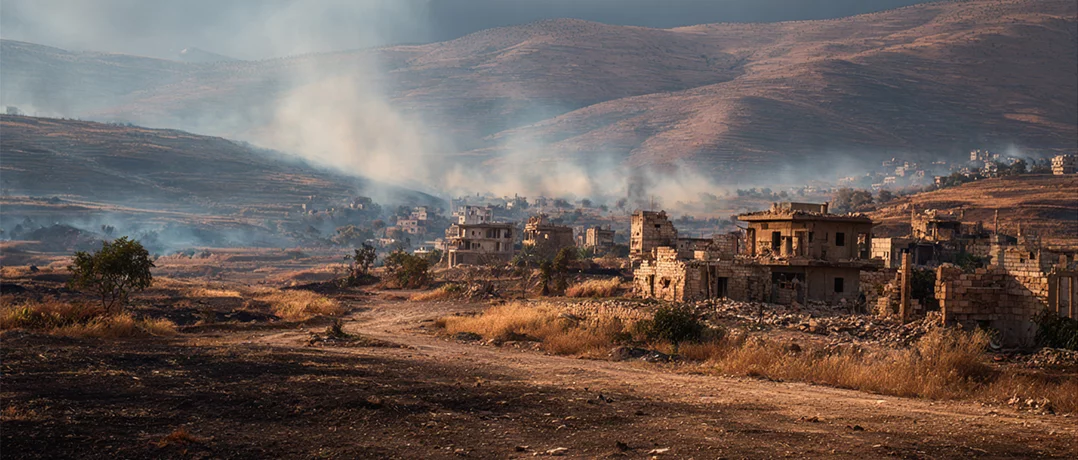Lebanon-Israel standoff: Israel intensifies pressure on Lebanon and Hezbollah, as Lebanon explores peace talks and foreign mediation.
Lebanon faces escalatory Israeli sentiments

The situation along the Lebanese Israeli border does not appear to deescalate, but rather quite the contrary. Last week, Israel embarked on an intensified campaign against not only Hezbollah, but Lebanon as a whole as well. The threats issued and activities conducted usher rising concerns of a potential renewal of armed conflict between the two sides. Should tensions persist, peace and prosperity remain a distant goal and a continuous wish amongst Lebanese.
Israel intensifies threats and activities with regards to Lebanon
On October 30, 2025, the Israel Defense Forces (IDF) raided a municipal government building in the border village of Blida in southern Lebanon, killing an employee named Ibrahim Salameh. The incident sparked massive outrage amongst both grassroots as well as official levels. The village’s residents expressed anger toward the Lebanese Armed Forces (LAF) and UNIFIL, who they said were failing to protect civilians. Meanwhile, President General Joseph Aoun tasked the army with confronting Israeli incursions in the South.
Additionally, Tel Aviv stepped up its warnings towards Lebanon during the weekend. These entailed threats issued by government officials as well as prominent Israeli newspapers. On November 2, 2025, Israel’s Defense Minister Israel Katz accused Hezbollah of “playing with fire,” and the Lebanese President of “dragging his feet.” He claimed that the “Lebanese government’s commitment to disarm Hezbollah and remove it from southern Lebanon must be implemented,” warning that “maximum enforcement will continue and even intensify.” Likewise, Israeli Prime Minister Benjamin Netanyahu issued a similar threat, claiming that Hezbollah was seeking to rearm and that Tel Aviv would “act as necessary” and exercise its right to self-defence under November 2024 ceasefire agreement should Beirut fail to disarm the Iranian-backed group. Meanwhile, Israeli newspaper Maariv reported that “the Israeli army is preparing for multiple scenarios on the northern front with Lebanon.” The newspaper pointed out that “Israeli intelligence has observed increased activity by Hezbollah in several Lebanese areas, including north of the Litani River, the Bekaa Valley, and south of Beirut,” considering that “Hezbollah is trying to carry out a dual strategy based on quietly rebuilding its strength while avoiding direct confrontation with Israel.”
The aforementioned warnings feed into the already tense situation and rumours of a potential Israeli military operation against not only Hezbollah infrastructure, but Lebanese ones as well.
Lebanon and foreign actors aim to prevent the worst
Lebanese as well as foreign officials have been on the run to ensure that the situation does not go out of hand, but rather achieve calm, de-escalation and possibly peace. Particularly, Egyptian intelligence chief Hassan Rashad and German Foreign Minister Johann Wade Phul have both conveyed notable messages to Beirut, including the importance of preventing any stalling or delay concerning Hezbollah disarmament. However, the two have also offered promising messages regarding Israeli withdrawal from Lebanon. Wade Phul asserted that “Israel must withdraw. I understand that Israel has security needs... But in fact, we now need a process of mutual trust-building.” Meanwhile, Rashad advised Lebanese authorities to encourage US President Donald Trump to intervene and pressure Tel Aviv to pull out from Lebanese territories, similar to his efforts in Gaza.
Lebanon has already offered some incentives as good faith towards beginning negotiations with Israel. After continuous American demands for Beirut to enter into direct and civilian negotiations with Tel Aviv, Lebanese officials offered preliminary approval for adding civilian technical experts (such as engineers and cartographers) to Lebanon’s military delegation in the “Mechanism” committee (which oversees the November 2024 cessation of hostilities agreement). However, despite the optimistic gesture, President Joseph Aoun considered that Israel “is responding to this option by carrying out more attacks against Lebanon... and intensifying tensions.” He emphasized the need for “mutual willingness” to begin constructive negotiations and reach common grounds on vital mutual concerns and issues.
Interestingly, the president’s task for LAF to confront Israeli incursions in the South is viewed as a positive and necessary step taken by Lebanese officials to many observers. Should it not have been made, Hezbollah would have rushed to fill the void and benefit from state absence to bolster its resistance claims. Therefore, with LAF establishing a military post in Blida, for instance, the Lebanese state seeks to reclaim the initiative and solidify its presence in the region.



